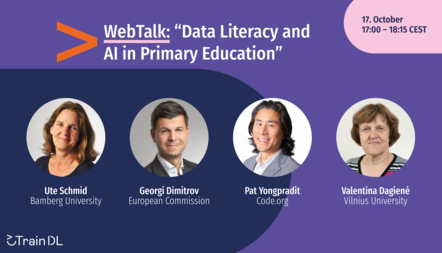AI and Data Literacy in Primary Schools – The TrainDL WebTalk
For this WebTalk in the TrainDL project, four experts came together to discuss the introduction of artificial intelligence (AI) and data literacy at the primary level.
If robot cats, humanoids helping kids cross the road or flying robots that help when children get hurt – there are a lot of different ways that young children imagine “Artificial Intelligence”. Breaking down complex digital concepts like AI and data in a school setting is only one of the challenges that come with the inclusion of more and more digital competencies in primary education. But this is a challenge worth the effort, as the experts highlight in this discussion.
In a short presentation, Valentina Dagienè, professor at Vilnius University, provided input on the importance of AI and data literacy in education and gave insights into the work done in the TrainDL project. Based on research done by the project partners, the team has conducted workshops with primary teachers to gain knowledge on how teachers can introduce these topics in class.
Here, especially unplugged activities like card games can prove the perfect start to basic concepts of AI, agrees Ute Schmid. As a starting point for the discussion, the experts explain how children conceptualize AI and data topics. While Ute Schmid shares pictures from a drawing competition on AI for young children, Pat Yongpradit ventures to explain AI to a primary school child in just a few sentences – a quite challenging task, which emphasizes the importance of supporting teachers with these new competencies.
As leader of TeachAI, Pat Yongpradit also talks about a toolkit the initiative has just launched that is supposed to be an initial step in guiding the use of AI in education globally. Georgi Dimitrov, head of the Digital Education unit in the European Commission, also shares about leverages for the introduction of digital competencies in so many different countries. For instance, which incentives work to further research and policy efforts? As one successful incentive, he mentions the Erasmus program and policy experimentations such as TrainDL.
To watch the experts talk about all this as well as improving equity by introducing digital competencies and their favorite resources, find the full recording here. In the video description, find resources and materials on the topic shared by the panelists Pat Yongpradit, Georgi Dimitrov, Valentina Dagienè and Ute Schmid.
This WebTalk is part of the TrainDL project, which is funded by the Erasmus Plus Program of the European Union and coordinated by the GI. Its central goal is to train teachers in data literacy and AI competencies and to support the structural implementation of these competencies in teacher training.

